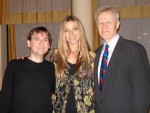Title
Axiom presented a version of last year’s Beyond the Machine (B.T.M.) 8.0 concert titled “The Art of the Groove” at the Tonhalle Small Hall in Zurich on September 7, as part of the Orpheum International Music Festival for the Advancement of Young Soloists … and it brought down the house. But how did Juilliard’s newest contemporary music ensemble end up playing a program of electronic and interactive music in one of the oldest and most traditional concert halls in Switzerland?
Body
The April 2007 B.T.M. concert at Juilliard titled “The Eye/Ear Collaboration” was reviewed in The New York Times—and caught the eye of the Orpheum Foundation’s managing director, Sylvester Vieli, who contacted Juilliard faculty member and B.T.M. director Edward Bilous about bringing students to perform a similar program in Zurich. But this was to be no mere replay of the original concert; while half of the performers would consist of Juilliard students who had been involved in the original presentation, the other half would be drawn from students from the Zürcher Hochschule der Künste (Zurich University of the Arts). The program put together for the festival in September included works from the 2008 concert, as well as a work by Bilous from the 2007 program.
The roster of Juilliard performers included current students Brent Grapes (trumpet), Lydia Hong (violin), David Huckaby (cello), and Justin Kujawski (double bass), as well as Jeremiah Duarte Bills (MM ’08, flute), Vicky Chow (BM ’05, MM ’07, piano), Jakub Ciupinski (MM ’08, composition), Geoffrey Hamlyn (MM ’08, viola), Vince Lee (Graduate Diploma ’07, orchestral conducting), and myself. We were also joined by Patrick Posey, Juilliard’s director of orchestral activities and planning, on saxophone, in addition to saxophonist Sarah Roberts. Nearly all of our time was reserved for rehearsing, but we did have some opportunities to socialize with our Zurich cohorts. This sense of camaraderie expedited the daunting task of putting together a program of this magnitude in three days time. Chow noted that what made the three long days so much fun was the opportunity to “work with other emerging musicians who are just as enthusiastic and share the love for contemporary music.”
One of the central tenets of a Beyond the Machine program is the employment of technology and its aural and visual components, which posed a number of challenges in an 18th-century concert hall. The array of speakers, computers, lights, and cables was something never imagined by the hall’s architects, and some elaborate pre-production work was required to accommodate all these elements. Axiom was quite fortunate to have consultant and sound engineer Willie Fastenow on hand.
The ensemble was under the direction of conductor Vince Lee, who is now the assistant conductor of the Cincinnati Symphony, and whose rehearsal experience was an incredible asset in putting together such a difficult piece in two days of rehearsals.
The entire program was performed against a backdrop provided by a large projector. The nature of the visual component was contingent upon the music. For instance, Mr. Bilous’s piece Lucid Dreams incorporates a collage of dancers in various poses in conjunction with quasi-psychedelic visualizations. Lydia Hong said she was impressed by the collaboration of traditional instruments with new technology. “I enjoyed watching pieces that I wasn’t part of, and I felt that, with our concern for dying art, this type of program really brought it back to life with regard to what appeals to a younger generation.”
Jakub Ciupinski’s Elvex featured a quartet of marimba, vibraphone, electric piano, and acoustic piano, with Ciupinski himself playing a set-up of theremins. The composer was pleased by the performance and noted that the “acoustics at the Tonhalle were perfect for my music.” Jeremiah Duarte Bills’s Incantation for solo flute involved extended techniques on the instrument in conjunction with electronic effects on a laptop. Ryan Francis’s work Music for Stringswas elegantly played by string players from both Juilliard and Zurich, led again by Lee.
Ron Ford’s Salome Fast was perhaps the most challenging piece to put together with the large ensemble. This piece utilized a solo speaker, Naures Atto, who ended the piece by speaking text from the 3,000 year-old Aramaic language into a microphone that became increasingly more and more distorted.
The final work on the program was Bilous’s Lucid Dreams. We were fortunate to have Bilous available at the rehearsals to help guide us through his work, which used the largest ensemble of the evening, including electric piano, electric bass, drum set, and most stunningly, vocalist Lori Cotler. She said that performing in Zurich was “exhilarating” and commended both Lee and the ensemble for being “completely aligned in creating a profound musical experience for the audience.”
Posey summed up the experience for everyone: “It was great to play with musicians from the Zurich University of the Arts, who (like students at Juilliard) come from many different countries. I particularly enjoyed that we were able to bring non-traditional ‘classical’ music to one of the world’s most traditional concert halls, to a very conservative audience in a very conservative city. The audience reacted quite enthusiastically, with multiple standing ovations. I feel that what we did may help in a small part to change their concept of what kinds of things are possible in a concert hall setting, and ultimately, broaden their musical landscape.”
The concert will broadcast in its entirety on November 5 on DRS, the Swiss-German national radio station.





